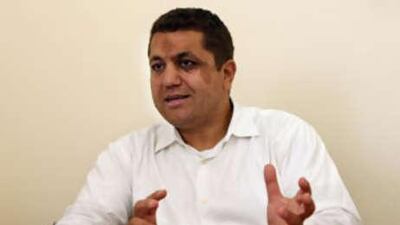DUBAI // The small, inconspicuous Maktoob.com office in Dubai Internet City is a hive of activity. The cramped maze of clustered desks tucked away in a sliver of the Samsung building belies the enormity of the task that this company, along with its headquarters in Jordan, has set for itself. The Arabic and English web portal knows that it is only a matter of time before the big boys of the internet - Yahoo, Facebook and eBay - roll out their services in Arabic, so it is working to shore up its online community and soak up subscribers.
Google has already launched Arabic versions of several of its services, including Google News in 2006 and Google Blogger in January. "We're always looking at the international brands because we know that they're coming into the region in the next few years, so we want to make sure that we're in the best position possible when they're here," said Ahmed Nassef, the vice president of Maktoob Group and general manager of Maktoob.com.
The company also keeps an eye on local Arabic sites and has acquired several in recent years, mainly from the Saudi market. It has soaked up popular online communities such as Alfrasha, a Saudi women's forum with more than a million subscribers, and Sport4ever, a Saudi sport site in which it has an 80 per cent stake. Mr Nassef would not disclose how much Maktoob paid for the websites, but said the acquisitions were part of the company's preparations to carve out as big a chunk of the online pan-Arab community as it could. And it appears to be doing so.
The portal's audience figures are on the rise. Some 9.6 million unique users visited the site in April, almost three million more than in June last year, according to the UK-based auditing firm ABC Electronic. Users accessing the website - which includes news, chat rooms, social networking areas, blogs and mobile downloads - viewed more than 224 million web pages in April. Saudi Arabia accounted for about a third of Maktoob's traffic, Mr Nassef said. The Arab world's most populous country, Egypt, is another growth area.
"Only 10 per cent of the [Egyptian] population is online, but that's growing tremendously and when you have a population of 80 million people you see that over the next couple of years Egypt is going to become a major user centre for our audience," he said. The company also wants to link in with Arabs in the diaspora. Mr Nassef attributes the surge in traffic to increased internet penetration in the Middle East and North Africa, the website's Arabic-language component and its focus on the global craze of social networking.
When Maktoob.com was first launched eight years ago as an Arabic and English email service, 80 per cent of its users surfed the site in English, Mr Nassef said. However, he said that number had reversed, with 90 per cent of people now using the Arabic interface. "We've known from the beginning that there will be a trend towards more of a focus on Arabic," he said. "The massive numbers of people going online are really more comfortable in Arabic and they want Arabic content and services."
Internet usage in the Middle East has increased 1,176 per cent from 2000 to 2008, according to the market research site internetworldstats.com. It went up 281 per cent in the rest of the world during the same period. Maktoob.com has also grown since 2000, from its origins as an email resource to incorporate some 12 sites and services, including the social networking platform As'hab Maktoob; Souq.com, an online auction house; an Arabic search engine called Araby.com and even a "marriage portal", Bentelhalal.
"Across the board, the majority of our users go to some sort of social network. Discussion forums are probably the single most popular channel on Maktoob," Mr Nassef said. The online communities also represented pools of potential customers that marketers could tap into. Mr Nassef would not disclose the revenue of the private company, but said the proceeds from advertising had climbed between 50 to 60 per cent year-on-year over the past three years.
The traditional banner ads and pop-ups accounted for 65 to 70 per cent of Maktoob's advertising revenue, but Mr Nassef said more targeted campaigns that honed in on consumers based on demographics, gender, country and age were growing. Maktoob did not sell that information to marketers, but rather acted as a conduit to consumers, Mr Nassef said. "The other kind of advertising is the sponsorship or engagement type of advertising," he said, highlighting a recent campaign with the non-alcoholic beverage Barbican, and a car show it sponsored on MBC that was basically a local version of MTV's Pimp My Ride.
"We targeted Saudi users and asked them to upload videos of their car and that one would be picked to be on the show each month," Mr Nassef said. More than 1,840 images were uploaded onto the site during the three-month campaign that ended in June. "That's the kind of stuff that is really additional relationship building with the brand and it incorporates the social media-type channels that we have on the website," Mr Nassef said.
While income from advertising contributes the bulk of Maktoob's revenue, the company also receives a growing contribution from its online market research unit, Maktoob Research, and is developing its mobile advertising and news arm. But according to Mr Nassef, the main issue now is "for us to really develop our platform, get users, develop a community". "We're playing in a field where Google, Yahoo, all of these guys are in it. With the exception of Google, they haven't really focused on this region," he said. "This has given us a little bit of a window to really consolidate our traffic and get our community together."
rabouzeid@thenational.ae

